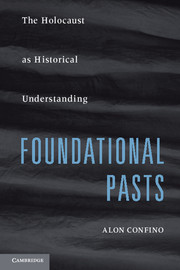4 - Beginnings and Ends
from Part Two - Thresholds and Limits of History
Published online by Cambridge University Press: 05 June 2012
Summary
Thinking about the French Revolution and the Holocaust requires placing these brief, violent, and radical events within narratives of beginnings and ends. Linking the events to what came before and after is crucial to the interpretation of what actually happened. Scholars are faced with explanatory temptations. One is to stress the events’ long-term origins, whereby origins stand in these explanations as markers of historical significance. The historian thus “discovers” large patterns and regularities in the development of historical events. It is comforting to think that a momentous event, such as, say, the Russian Revolution, was not the result of contingent actions that led to unintended consequences and unpredictable outcomes, but was rather part of a long historical script in which the “road to the Russian Revolution” started with Ivan the Terrible, Peter the Great, the 1825 Decembrist revolt of young military officers against Nicholas I, or the 1881 assassination of Alexander II by an anarchist. Another temptation is to stress the events’ unprecedented nature, whereby historical rupture stands as a marker of significance. Uniqueness becomes the hallmark of the event, as ties to the past are severed. In the case of the Holocaust this view serves, among others, to assuage our anxiety that it was an inherent part of our civilization. A final temptation is to read the event in the key of an outcome: in this case what really happened is less important than what a given historical script predetermined. Marxists saw the French Revolution as the beginning of the bourgeois historical epoch. Quite dramatic, no doubt, but this view ascribed to the actors of the Revolution results they never intended and it ultimately explained their behavior by factors beyond their control.
These temptations are known to historians. In a period when leading principles of historical understanding are contingency, complexity, and ambiguity, historians are aware of their fallacy. Nonetheless, events such as the French Revolution and the Holocaust have always attracted narratives of beginnings and ends, of origins and outcome. Historians are part of their society, and it is all too human to explain the world in terms of “unity and symmetry at the expense of experience,” as Isaiah Berlin wrote in his essay “Historical Inevitability.” Historians can never reach a cultural Archimedean point from which one can interpret the world from the “outside.” They are always “inside” culture; they are a product of the intellectual tradition and historical mentality of their society, while attempting at the same time to explain and criticize it. The temptations are known, but the idea that history is governed in some way, even in a reduced and minimal way, by large patterns or regularities is also attractive. How to capture the antecedents of the Revolution and the Holocaust without crafting a narrative of origins? How to capture their tremendous rupture without losing sight of historical continuity?
- Type
- Chapter
- Information
- Foundational PastsThe Holocaust as Historical Understanding, pp. 67 - 82Publisher: Cambridge University PressPrint publication year: 2011



